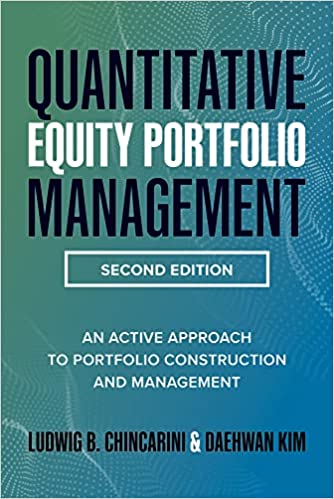Quantitative Equity Portfolio Management, 2nd Edition
Capitalize on Today’s Most Powerful Quantitative Methods to Construct and Manage a High-Performance Equity Portfolio
Quantitative Equity Portfolio Management is a comprehensive guide to the entire process of constructing and managing a high-yield quantitative equity portfolio. This detailed handbook begins with the basic principles of quantitative active management and then clearly outlines how to build an equity portfolio using those powerful concepts. When this classic guide was first published in 2006, quantitative equity portfolio management was an investing approach reserved for elite hedge funds.
Since then, however, the field has exploded—growing from $238 billion in assets under management to well over $2 trillion today. Now, the authors have brought Quantitative Equity Portfolio Management completely up to date, helping any sophisticated investor construct and manage a high-yield equity portfolio using today’s most powerful tools and methods.
Quantitative Equity Portfolio Management provides detailed coverage of critical topics, including portfolio optimization, rebalancing and transaction costs, tax management, leverage, backtesting, and much more. The new edition includes fully updated tables and graphs, with downloadable monthly factor returns.
Filled with practical—and replicable—techniques, this book includes:
- Advice for building smart beta ETFs and mutual funds
- Factor definitions and tests of their outperformance with real stock return data
- Labs using real data written in R, MATLAB, and STATA. These are available on the website – www.ludwigbc.com under exclusive password protected website – contact authors for access.
- On the accompanying website, the solutions to all chapter
- Methods for dealing with outlier data
- Reliable methods to deal with transaction costs
- Details on the behavioral biases and market frictions that can lead to investment anomalies
- Applications of ESG data to create socially responsible portfolios
- Advanced techniques for optimizing market-neutral portfolios
- An excellent melding of financial theory with real-world practice
- A wealth of down-to-earth financial examples and case studies
An essential reference for professional money managers and students taking advanced investment courses, Quantitative Equity Portfolio Management offers a full array of methods for developing high-performance equity portfolios that deliver lucrative returns for clients.
Each chapter of this all-in-one portfolio management resource contains an appendix with valuable figures, tables, equations, mathematical solutions, and formulas. In addition, the book as a whole has appendices covering a brief history of financial theory, fundamental models of stock returns, a basic review of mathematical and statistical concepts, an entertaining explanation and quantitative approach to the casino game of craps, and other on-target supplemental materials.
An essential reference for professional money managers and students taking advanced investment courses, Quantitative Equity Portfolio Management offers a full array of methods for effectively developing high-performance equity portfolios that deliver lucrative returns for clients.
About the Authors
 Ludwig B. Chincarini, CFA, PhD, is Professor of Finance in the School of Management at the University of San Francisco, Executive Director and Co-Founder of the Silk Institute, Academic Consultant to Wedge Capital Management, and Advisor to Rukfunds. Prior to this, he was Director of Quantitative Strategies for United States Commodity Fund Investments. As a member of the academic council of Index IQ, he was instrumental in creating and developing some of the newest alternative ETFs. Chincarini served on the academic council of Future Advisor, one of the early Robo-Advisor firms, which was purchased by BlackRock in 2015. He also co-developed the S&P 500 equal-weight ETF (RSP) and index and helped build one of the first basket trading brokerages—Folio Investing (purchased by Goldman Sachs)—with automated procedures to manage hundreds of quant portfolios. He is author of the new concept of crowding in The Crisis of Crowding. He received a PhD from the Massachusetts Institute of Technology and an BA from the University of California at Berkeley.
Ludwig B. Chincarini, CFA, PhD, is Professor of Finance in the School of Management at the University of San Francisco, Executive Director and Co-Founder of the Silk Institute, Academic Consultant to Wedge Capital Management, and Advisor to Rukfunds. Prior to this, he was Director of Quantitative Strategies for United States Commodity Fund Investments. As a member of the academic council of Index IQ, he was instrumental in creating and developing some of the newest alternative ETFs. Chincarini served on the academic council of Future Advisor, one of the early Robo-Advisor firms, which was purchased by BlackRock in 2015. He also co-developed the S&P 500 equal-weight ETF (RSP) and index and helped build one of the first basket trading brokerages—Folio Investing (purchased by Goldman Sachs)—with automated procedures to manage hundreds of quant portfolios. He is author of the new concept of crowding in The Crisis of Crowding. He received a PhD from the Massachusetts Institute of Technology and an BA from the University of California at Berkeley.
 Daehwan Kim, Ph.D., is a professor in the Department of Economics at Konkuk University, South Korea. Previously, he taught at American University in Bulgaria, Ewha Womans University School of Public Policy, Korea University, Aalto University Executive Program, NUCB Business School, and Nizhny Novgorod State University. Kim worked for Folio Investing as a financial economist and for First Private Investment Management in Frankfurt as a senior portfolio manager, and he has advised several hedge funds and investment companies based in East Asia. He also holds a Ph.D. in economics from Harvard University.
Daehwan Kim, Ph.D., is a professor in the Department of Economics at Konkuk University, South Korea. Previously, he taught at American University in Bulgaria, Ewha Womans University School of Public Policy, Korea University, Aalto University Executive Program, NUCB Business School, and Nizhny Novgorod State University. Kim worked for Folio Investing as a financial economist and for First Private Investment Management in Frankfurt as a senior portfolio manager, and he has advised several hedge funds and investment companies based in East Asia. He also holds a Ph.D. in economics from Harvard University.
The first edition of QEPM has been used as a reference source for leading practitioners and used to teach at many business schools throughout the world. Some of the business schools that were gracious enough to use the book in the past include Harvard Business school, UCLA, the University of Chicago’s Booth School of Business, Bocconi University in Italy, Macquarie University in Australia, The University of Maryland Robert Smith School of Business, Warwick Business School, Hagan School of Business, Pepperdine University, Pomona College, Addis Ababa University in Ethiopia, the University of Central Missouri, the American University in Bulgaria, Konkuk University in South Korea, the University of Hong Kong, Chulalongkorn University in Thailand, Diego Portales University, NYU Polytechnique, Jindal Global Business School, Cornell University, Universidad Jesuita de Guadalajara, Institute for Technology and Management in Mumbai, University of Miami School of Business Administration, ALBA Graduate Business school at The American College of Greece, and many others. We thank you all for using our book.
Book Reviews
